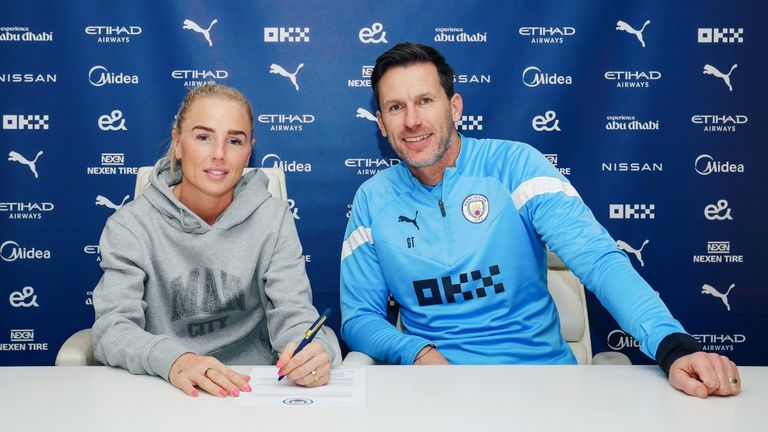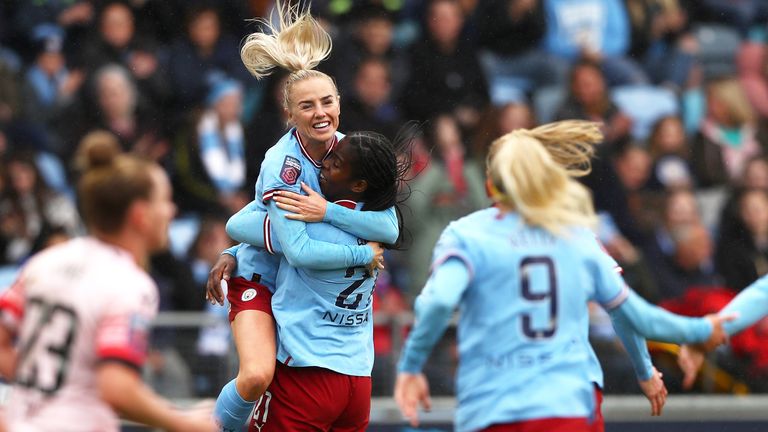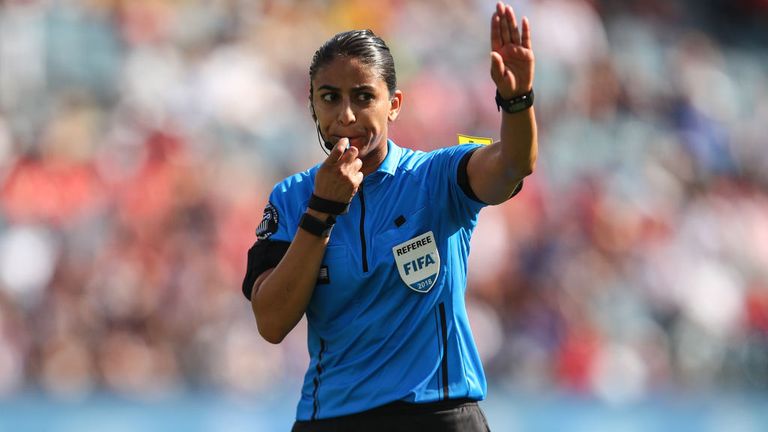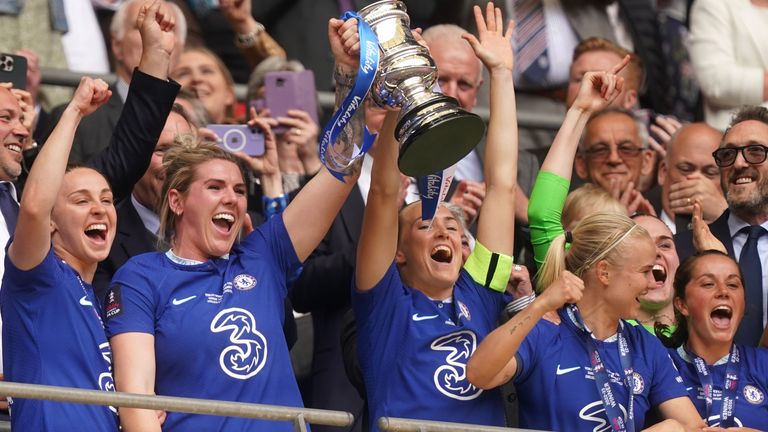Alex Greenwood shows benefits data analysis can have on women's game
autty 2023-07-26 14:13:04 评论
Once lacking a back catalogue of facts, figures and essential stats, analytic companies are finally branching out into the women’s game.

So much so that when Alex Greenwood went into contract negotiations with Manchester City last season, she was armed with a data report comprising vital stats to demonstrate how valuable she was to the club. For women's football which has so far been starved of top-end stats, it was a game-changing moment.
The England international, who along with her management agency Rept Sports, worked with football data company Analytics FC to crunch the numbers.
"When we started working with Alex, we recognised it would be a bit more difficult than a standard report. We took different angles and different approaches to bring about the information that was required," Analytics FC CEO Jeremy Steele told Sky Sports.

"There was a question mark around her defensive aspects. We thought she'd been asked to do a job very similar to the players in the men's team. So, we took that and thought, 'let's have a look. Let's compare her to John Stones, Ruben Diaz, and Aymeric Laporte. They have an almost identical profile to her'."
The report said that Greenwood's contribution to Goal Difference Added (GDA) - a measure used to evaluate a player's total contribution to a game - was unrivalled as a central defender.
"We looked at her output in the Women's Super League against the output of the best centre-backs in the world in the men's game. Someone like Virgil Van Dijk, how much better is he than the average centre-back, and how much better is Greenwood compared to the average centre-back?"
Sure enough, the results proved that Greenwood contributed +0.1 GDA per game more than Van Dijk for Liverpool in the same two seasons.
Over an entire WSL campaign, her contribution would be +2 goals better than Van Dijk's in terms of goal difference.
"The difference is big. He is obviously better than the average centre-back, and that gap allows him to be paid elite money. She should be considered the same in the women's game."
Steele also elaborated on how Analytics FC looked into how vital Greenwood was to City's European ambitions.
"You can do projections of the chances of Man City qualifying for the Champions League with Alex," he added. "You remove her from that and replace her with an average centre-back, and the difference is five per cent. You can then start to link that financial reward.
"Not qualifying for the Champions League costs Man City a certain amount of millions. If that five per cent turns into hundreds and thousands, you might as well have paid her the money because that gets you what you want.
"The flip side of that is if she leaves, you have to do that calculation on all of your rivals and figure out their chances of qualifying for the Champions League."
'Data to be increasingly used in women's football'
Alex Stewart, Analytics FC's head of content, expanded on Steele's insight, providing a broader understanding of the use of data analytics in women's football.
"Greenwood might be the first player in women's football we've done this with, but there's two similar cases in men's football - Hector Bellerin and Kevin De Bruyne - so it's likely she was aware of us through the City link," said Stewart.
He also admitted that "there's going to be cross-pollination on ideas and services" when men's and women's teams coexist.
"As the amount of money going into women's football increases, and the availability of information on good players in other leagues increases, data will be increasingly used," he added.
"If you're a club in the WSL, and you know you have access to video and data, it'll make life much easier. And that was less the case even a few years back when only the top teams could do that," Stewart said.
The scope for using data in women's football has levelled up, and that has been apparent in the increase in data availability.
For instance, StatsBomb offers free access to their IQ Analytics platform, open to all teams in the top women's leagues in England, France, Germany, Italy, Spain, USA, and for the first, in Sweden's Damallsvenskan.
They are just one of many companies on the market. Wyscout provides similar services as the world's most comprehensive football video archive by making video clips easily downloadable for film sessions.
FBref is another platform that has recently made data for women's football more accessible and add Opta Analyst to the list and it's clear that we are entering an unprecedented era for data analysis usage in women's football.
"Previously, not many firms were actively collecting women's football data on the scale it's done in men's football. Companies are getting past that hurdle as they see that the financial interest in the women's game is growing.
"If you're a data provider, they're looking at it and thinking, 'people will start paying for this soon even if it's not happening now.'"
Analytics FC's partnership with Lewes Women's football club is a prime example.
"We've just signed with Lewes FC and are providing them access to our TransferLab platform," Stewart explained. "That kind of forward-thinking is exactly why clubs would harness data to make good decisions."
The TransferLab platform allows clubs to use advanced data and "cutting edge algorithms" for scouting players online and uses event data from over 100 men's and 20 women's leagues from around the world.
While data in the women's game is starting to grow, use of technology on the pitch is yet to be rolled out in the WSL and officials are still not yet full-time.
What about the future of officiating?
Man Utd Women manager Marc Skinner was disgruntled by a lack of professionalism in officiating when his side were denied a couple of penalty appeals against Chelsea towards the latter stages of last season.
"We need to support the referees in being full-time and getting paid to really look after their craft because we're moving to a professional model and yet our refereeing isn't. I think technologies, especially even the lite versions, can help support decisions," Skinner said.
"But it's frustrating. The reality is, in big games you need people to make big calls. I think any support we can give - even if the clubs review what support we can give as well to the financial aspects - should be looked at. We should be making our officials full-time as the minimum and then looking to add technology around it."
Football laws analyst Christina Unkel, who has become one of the most prominent officiating figures in the world with 16 years of officiating under her belt, has overseen the inception of VAR to its current state.
"None of us knew what we were doing. It was 2017. We [Major League Soccer] were the only league to implement it that year. So, we created the VAR protocols before it was even used on the field," she said.
"We trained with it for a year and a half, and thankfully it has served me very well in this next phase of my career, which has been sports journalism broadcasting. I serve domestically as a rule analyst. I also do the breakdown and explanations for laws in soccer here in the United States."

The 36-year-old initially had doubts about using technology in sports but has changed her mind in recent years.
"Initially, I wasn't a fan of VAR for one reason. From a refereeing perspective, there's this idea we have to reach the perfection that even Einstein acknowledges is impossible. But I wasn't a fan of that because players make mistakes, right? Coaches make mistakes, and it's just part of the game.
"I'm a romantic at heart when it comes to overcoming odds and making up for what you lost. There are times when, as referees, we are the only people in the world before any technology who have to make a split decision on what's happened.
"We're the only ones who could change it too. So, don't get me wrong, I am a big fan of VAR now because there are moments where if we just had that second look, it gives that referee team the ability to correct that decision, where humanly it's impossible to do so".
'There's always going to be controversy in football'
How does Unkel foresee VAR developing within women's football?
"Getting consistent with VAR involves education, training, video clips, countless hours of watching the footage," she explains. "Talking with the referee managers and other referee colleagues also helps."
This year's Women's FA Cup final witnessed VAR's debut in the competition with officials including referee Emily Heaslip given plenty of time to prepare. Unkel wants to ensure the measures put in place are exact for all the games that follow but also had a warning of caution.
"There's always going to be controversy in football. Whether we have the technology or cameras shooting down the touchline like goal-line technology, you can only see it through one lens when you're passionate and a fan," she said.

"There are grey areas in our game, which makes football beautiful. There is a lot of subjectivity. Football really isn't a science when it comes to refereeing. It's an art. So, the more we try to make it scientific, the more you lose that beauty of what it is.
"When it comes to perfecting football, people need to put more realistic expectations on it. The more people can temper their expectations and not expect perfection, the more they'll enjoy the game."
One thing's for sure, the technology is there to support football, and with right guidance, resource and training, there is a chance to take another step forward in the women's game, just like we are with the data revolution.
- 消息参考来源: SKY_SPORT
- 严禁商业机构或公司转载,违者必究;球迷转载请注明来源“懂球帝”
- 懂球帝社区规范:抵制辱骂

